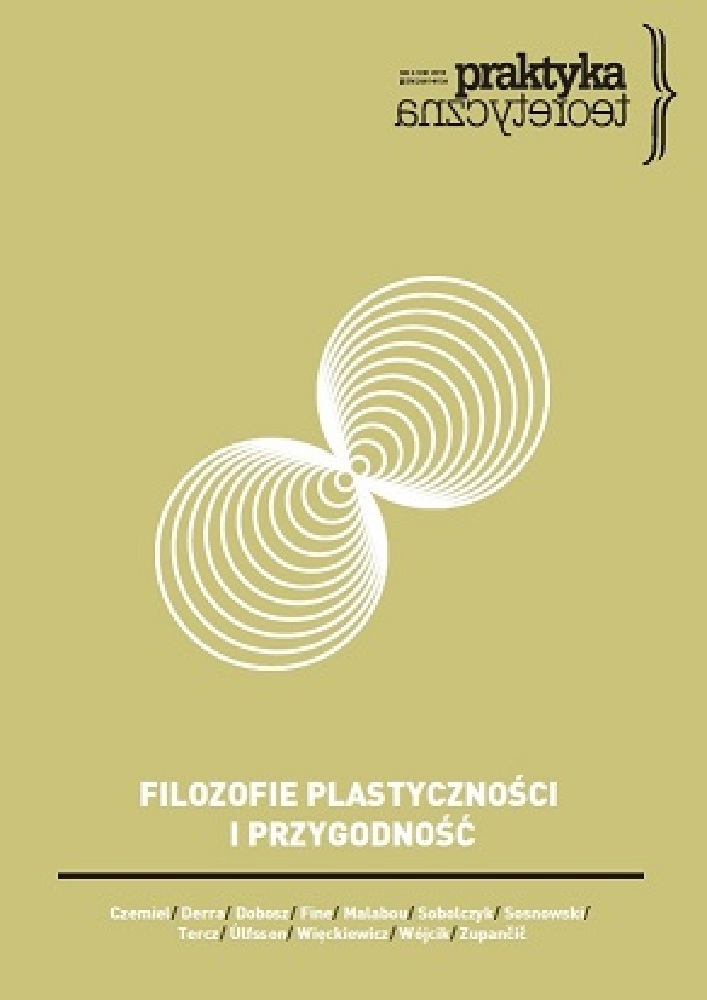Abstract
The article presents a new interpretation of works written by Helene Deutsch, Polish psychoanalyst, one of the closest colleagues of Sigmund Freud and the precursor of women’s psychoanalysis. Beginning with the social and cultural history of psychoanalysis, I try to (re)argue and (re)read the works of female analysts in Freud’s movement, especially those by Deutsch. In the article I propose the unfamiliar and new possibility of studying and writing about women’s psychoanalysis. One approach to the work of Polish analysts is to understand it not only as a clinical theory but also as a literature and philosophy. Working on a famous theory of „as if‖ identification, developed by Deutsch, in the light of the concept of plasticity proposed by French philosopher Catherine Malabou, the article is a contribution to a new method in reading and understanding theory as well as non-clinical works by Polish analysts through the categories of identity, memory and plasticity.References
Andreas-Salomé, Lou. 1983. In der Schule bei Freud. Frankfurt am Main: Ullstein.
Beauvoir, Simone de. 2014. Druga płeć. Tłum. Gabriela Mycielska i Maria Leśniewska. Warszawa: Wydawnictwo Czarna Owca.
Badinter, Élisabeth. 1998. Historia miłości macierzyńskiej. Tłum. Krzysztof Choiński. Warszawa: Oficyna Wydawnicza Volumen.
Braidotti, Rosi. 2009. Podmioty nomadyczne: Ucieleśnienie i różnica seksualna w feminizmie współczesnym. Tłum. Aleksandra Derra. Warszawa: Wydawnictwo Akademickie i Profesjonalne.
Chodorow, Nancy J. 1999. „La psychanalyse et les femmes psychanalystes". W Les femmes dans l'histoire de la psychanalyse, red. Sophie de Mijolla- Mellor. Bordeaux-Le-Bouscat: Esprit du Temps.
Deutsch Helena. 1944/1945. The Psychology of Women. New York: Grunne and Stratton.
Deutsch Helena. 2008. Konfrontacja z samą sobą: Epilog. Tłum. Adam Pluszka. Warszawa: Cyklady.
Deutsch, Helena. 2016a. „O homoseksualizmie kobiecym". Tłum. Mateusz Franczak. W Psychoanaliza w Polsce 1909-1946, red. Lena Magnone. Warszawa: Kronos.
Deutsch Helena. 2016b. „Osobowość »jak gdyby«". Tłum. Mateusz Franczak. W Psychoanaliza w Polsce 1909-1946, red. Lena Magnone. Warszawa: Kronos.
Deutsch, Helena. 2016c. „Psychologia kobiet w odniesieniu do funkcji prokreacji". Tłum. Mateusz Franczak. W Psychoanaliza w Polsce 1909-1946, red. Lena Magnone. Warszawa: Kronos.
Ferenczi, Sándor. 1924. Versuch einer Genitaltheorie. Wien–Leipzig: Internationaler Psychoanalytischer Verlag.
Freud, Sigmund i Josef Breuer. 2008. Studia nad histerią. Tłum. Robert Reszke. Warszawa: Wydawnictwo KR.
Freud, Sigmund. 2009a. Pisma społeczne. Tłum. Robert Reszke. Warszawa: Wydawnictwo KR.
Freud, Sigmund. 2009b. Życie seksualne. Tłum. Robert Reszke. Warszawa: Wydawnictwo KR.
Friedan, Betty. 2012. Mistyka kobiecości. Tłum. Agnieszka Grzybek. Warszawa: Wydawnictwo Czarna Owca.
Gilman, Sander L. 1993. Freud, Race, and Gender. Princeton: Princeton University Press.
Gilmore Leigh. 1994. Autobiographics: The Feminist Theory of Women’s Self-Representation. Ithaca –London: Cornell University Press.
Magnone, Lena. 2016a. Emisariusze Freuda: Transfer kulturowy psychoanalizy do polskich sfer inteligenckich przed drugą wojną światową. Kraków: Universitas.
Magnone, Lena 2016b. „Psychoanaliza w Polsce?". W Psychoanaliza w Polsce 1909-1946, red. Lena Magnone. Warszawa: Kronos.
Malabou, Catherine. 1996. L’Avenir de Hegel: Plasticité, temporalité, dialectique. Paris: Libr. Philosophique J. Vrin.
Malabou, Catherine. 2004. Que faire de notre cerveau. Paris: Bayard.
Malabou, Catherine. 2007. Les nouveaux blessés: De Freud à neurologie. Penser le traumatisme contemporains. Paris: PUF.
Malabou, Catherine. 2016a. „Plastyczność a cierpienie mózgowe i psychiczne". Tłum. Mateusz Burzyk. Znak 731. http://www.miesiecznik.znak.com.pl/to-samo-jest-rozne/.
Malabou, Catherine. 2016b. „To samo jest różne‖. Tłum. Piotr Sawczyński. Znak 731. http://www.miesiecznik.znak.com.pl/to-samo-jest-rozne/.
Malabou, Catherine. 2017. Ontologia przypadłości: Esej o plastyczności destrukcyjnej. Tłum. Piotr Skalski. Warszawa: Fundacja Augusta hr. Cieszkowskiego.
Mitchel, Juliette. 1973. Psychoanalysis and Feminism: Freud, Reich, Laing and Women. New York: Vintage Books.
Mühlleitner, Elke. 1999. „Les femmes et le mouvement psychanalytique à Vienne". W Les femmes dans l'histoire de la psychanalyse, red. Sophie de Mijolla- Mellor. Bordeaux-Le-Bouscat: Esprit du Temps.
Mühlleitner, Elke i Johannes Reichymayr. 1997. „Following Freud in Vienna: The Psychological Wednesday Society and the Viennese Psychoanalytical Society 1902–1938". International Forum of Psychoanalysis 6: 73–102.
Rank, Beata. 2016. „Rola kobiety w ewolucji społeczeństwa". Tłum. Mateusz Franczak. W Psychoanaliza w Polsce 1909-1946, red. Lena Magnone. Warszawa: Kronos.
Schorske, Carl E. 1980. Fin-de-Siècle Vienna: Politics and Culture. New York: Knopf.
License
“Theoretical Practice” seeks to put into practice the idea of open access to knowledge and broadening the domain of the commons. It serves the development of science, thinking and critical reflection. The journal is published in open-access mode under the CC-BY-NC-SA 4.0 license (detail available here: http://creativecommons.org/licenses/by-nc-sa/4.0/). Articles published in the journal may be freely distributed, stored, printed and utilized for academic and teaching purposes without restrictions.
They should not be, however, used for any commercial purposes or be reconstructed into derivative creations. Access to the journal may not be limited or offered for a fee by any third party.
Prospective authors are obliged to fill in, sign and send back the publishing contract compliant with the CC licencing. [PL.pdf, PL.doc, EN.pdf,EN.doc].
According to this contract, authors grant the journal a non-exclusive right to publish their work under the creative commons license (CC-BY-NC-SA 4.0) without any financial obligation on both sides of the contract.
Before submission authors should make sure that derivative materials they use are not protected by copyright preventing their non-commercial publication. Authors are responsible for any respective copyright violations.
